this class describes an array More...
#include <CORE_Array.h>
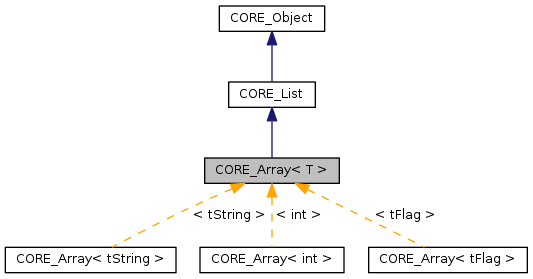
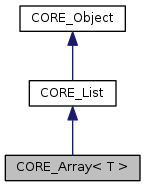
Public Member Functions | |
| CORE_Array () | |
| build an array of T* More... | |
| template<class Q > | |
| CORE_Array (const std::vector< Q > &values) | |
| build an array of T* More... | |
| CORE_Array (const tArrayIndex &n) | |
| build an array of T* of size n More... | |
| virtual | ~CORE_Array () |
| destroy an array of T* More... | |
| void | getSharedPointer (boost::shared_ptr< CORE_Array< T > > &p) |
| return the shared pointer corresponding to the class with casting More... | |
| void | getSharedPointer (boost::shared_ptr< const CORE_Array< T > > &p) const |
| return the shared pointer corresponding to the class whith casting More... | |
| const T & | operator[] (const tArrayIndex &i) const |
| get the i-th element Assert in (i>-1) Assert in (i<size()); More... | |
| T & | operator[] (const tArrayIndex &i) |
| get the i-th element Assert in (i>-1) Assert in (i<size()); More... | |
| T & | operator() (const tArrayIndex &i) |
| const T & | operator() (const tArrayIndex &i) const |
| T & | operator= (const CORE_Array< T > &f) |
| operator = More... | |
| T & | operator/= (const T &f) |
| operator /= More... | |
| T & | operator*= (const T &f) |
| operator *= More... | |
| T & | operator+= (const T &f) |
| operator += More... | |
| T & | operator-= (const T &f) |
| operator -= More... | |
| const T & | get (const tArrayIndex &i) const |
| get the value at index i Assert in (i>-1) Assert in (i<size()); More... | |
| T & | get (const tArrayIndex &i) |
| get the value at index i Assert in (i>-1) Assert in (i<size()); More... | |
| const T & | getValue (const tArrayIndex &i) const |
| get the value at index i Assert in (i>-1) Assert in (i<size()); More... | |
| const T & | getLastElement () |
| get last element Assert in (mSize>0) More... | |
| const tFlag & | getCapacityFactor () const |
| get the capacity factor More... | |
| const tArrayIndex & | getStartIndex () const |
| get start index More... | |
| const tArrayIndex & | size () const |
| return the size of the array More... | |
| const tArrayIndex & | getSize () const |
| return the size of the array More... | |
| const tArrayIndex & | getCapacity () const |
| return the memory allocation size of the array More... | |
| void | copy (const CORE_Array< T > &src) |
| void copy More... | |
| void | copy (const CORE_Array< T > *src) |
| void copy More... | |
| void | setStartIndex (const tArrayIndex &n) |
| set the start index of the array adjust the size of the array such that the last element of the array is always the last element i.e: suppose size is 5 setStartIndex(2);-> size=3 setStartIndex(1);->size=4 setStartIndex(0);->size=5 More... | |
| void | setSize (const tArrayIndex &n) |
| set the size of the array More... | |
| void | setCapacityFactor (const tFlag &n) |
| set the capacity factor More... | |
| void | setCapacity (const tArrayIndex &c) |
| set the capacity of the vector More... | |
| void | setValues (const CORE_Array< T > &array, const tArrayIndex &fromIndex) |
| void | setValues (const CORE_Array< T > &array) |
| void | setValues (const CORE_Array< T > *array) |
| copy a CORE_Array and convert it More... | |
| void | setValues (const tArrayIndex &n, const T *array, const tArrayIndex &fromIndex) |
| copy an array of T on size n to the This value from fromIndex and set the start index to fromIndex. More... | |
| void | setValues (const tArrayIndex &n, const T *array) |
| copy an array of T More... | |
| void | setValuesByReference (const tArrayIndex &n, T *&array, const tBoolean &hasToBeDeleted) |
| set the the values by reference the values is destroyed at the end if hasToBeDeleted is true More... | |
| void | setValues (const vector< T > &array, const tArrayIndex &fromIndex) |
| copy an array of T from fromIndex index and set the start index to fromIndex. More... | |
| void | setValues (const vector< T > &array) |
| void | setValues (const tString &str, const tArrayIndex &fromIndex) |
| void | setValues (const tString &str) |
| void | set (const tArrayIndex &i, const T &obj) |
| set the object at the index i More... | |
| void | setValue (const tArrayIndex &i, const T &obj) |
| set the object at the index i More... | |
| void | initValues (const T &v) |
| init all values to v More... | |
| void | resize () |
| resize the array to the util size More... | |
| void | resize (const tArrayIndex &n) |
| resize the array to n More... | |
| void | contractToLastElements (const tArrayIndex &n) |
| keep only the last n elements of the array and set its capacity also to n More... | |
| const T * | getValues (tArrayIndex &s) const |
| get the values of the util vector More... | |
| const T * | getValues () const |
| get the values of the util vector More... | |
| T * | getValues () |
| get the values of the util vector More... | |
| T * | getValues (tArrayIndex &s) |
| get the values of the util vector More... | |
| const T * | getCompleteValues (tArrayIndex &s) const |
| get the values of the complete vector More... | |
| T * | getCompleteValues (tArrayIndex &s) |
| get the values of the complete vector More... | |
| void | addAfterIndex (const tArrayIndex &index, const T &v) |
| add an element after index More... | |
| void | addAfterIndices (const CORE_Array< tArrayIndex > &indices, CORE_SharedPointersList< CORE_Array< T > > &values) |
| add alements after indices More... | |
| tArrayIndex | insert (const tArrayIndex &i, const T &obj) |
| insert the object at index i re-allocate the array if capacity too small More... | |
| tArrayIndex | insertInOrder (const T &obj, const tBoolean &evenIfEqual) |
| insert the object in increasing order More... | |
| tArrayIndex | insert (const T &obj) |
| insert the object in increasing order More... | |
| void | add (const T &obj) |
| add an element at the end re-allocate the array if capacity too small More... | |
| void | merge (const CORE_Array< T > &array) |
| merge the array in this More... | |
| void | append (const CORE_Array< T > &array) |
| merge the array in this More... | |
| tBoolean | remove (const T &obj) |
| remove the object More... | |
| tBoolean | removeAtIndex (const tArrayIndex &i) |
| tBoolean | remove () |
| remove the last element More... | |
| virtual void | clear () |
| clear the array More... | |
| tBoolean | getIndex (const T &v, tArrayIndex &index) const |
| get the index of value return false if no value in index More... | |
| tBoolean | getInfIndex (const T &v, tArrayIndex &index) const |
| get the inf index of value return false if no value less than v More... | |
| tBoolean | getSupIndex (const T &v, tArrayIndex &index) const |
| get the sup index of value return false if no value less than v More... | |
| tBoolean | exists (const T &obj) const |
| exists More... | |
| void | reverse () |
| reverse the vector More... | |
| int | search (const T &value, const tString &order) |
| search the value in values vector ordered in order More... | |
| void | sort () |
| sort the array in an increasing order More... | |
| void | sort (const tString &order) |
| sort the array More... | |
| tString | toString () const |
| turn the array into string More... | |
| T | norm2 () const |
| get the norm More... | |
| T | norm () const |
| get the norm squared More... | |
| T | distance2 (const CORE_Array< T > &y) const |
| return distance squared More... | |
| T | distance (const CORE_Array< T > &y) const |
| get the distance More... | |
| void | getSharedPointer (SP::CORE_Object &p) |
| get the shared pointer of this class into p More... | |
| void | getSharedPointer (SPC::CORE_Object &p) const |
| get the shared pointer of this class into p More... | |
| tString | getClassName () const |
| return the class name of the object More... | |
| tString | getIdentityString () const |
| return the identity string of the object of the form className_at_address More... | |
| tString | getPointerAddress () const |
| return the identity string of the object More... | |
| template<class T > | |
| tBoolean | isInstanceOf () const |
| return true if the object is an instance of T More... | |
| virtual void | print () |
| print the class More... | |
| virtual ostream & | print (ostream &out) const |
| print the class More... | |
| virtual void | print (const tString &message) |
| print the class More... | |
| virtual void | print (const tInteger &str) |
| print More... | |
| virtual void | print (const tRelativeInteger &str) |
| print More... | |
| virtual void | print (const tReal &str) |
| print More... | |
| virtual void | print (const int &str) |
| print More... | |
Static Public Member Functions | |
| static boost::shared_ptr < CORE_Array< T > > | New () |
| return a CORE_Array shared pointer More... | |
| static boost::shared_ptr < CORE_Array< T > > | New (const tArrayIndex &n) |
| return a CORE_Array shared pointer More... | |
| static tBoolean | search (const T *values, const tArrayIndex &n, const T &value, const tString &order, tArrayIndex &index) |
| search the value in values array ordered in order More... | |
| static void | sort (T *&items, const tArrayIndex &N, const tString &order) |
| sort the array pointer More... | |
| static tBoolean | compare (const tString &a, const tString &b, const tString &order) |
| compare 2 strings More... | |
| static tBoolean | compare (const int &a, const int &b, const tString &order) |
| compare 2 ints More... | |
| static tBoolean | compare (const tReal &a, const tReal &b, const tString &order) |
| compare 2 reals More... | |
| static tBoolean | areEqual (const int &a, const int &b) |
| compare 2 primitive object More... | |
| static tBoolean | areEqual (const long int &a, const long int &b) |
| compare 2 primitive object More... | |
| static tBoolean | areEqual (const float &a, const float &b) |
| compare 2 primitive object More... | |
| static tBoolean | areEqual (const double &a, const double &b) |
| compare 2 primitive object More... | |
| static tBoolean | areEqual (const long double &a, const long double &b) |
| compare 2 primitive object More... | |
| static tBoolean | areEqual (const short &a, const short &b) |
| compare 2 primitive object More... | |
| static tBoolean | areEqual (const unsigned char &a, const unsigned char &b) |
| compare 2 primitive object More... | |
| static tBoolean | areEqual (const unsigned long int &a, const unsigned long int &b) |
| compare 2 primitive object More... | |
| static tBoolean | areEqual (const bool &a, const bool &b) |
| compare 2 primitive object More... | |
| static tBoolean | areEqual (const char &a, const char &b) |
| compare 2 primitive object More... | |
| static tBoolean | areEqual (const complex< double > &a, const complex< double > &b) |
| compare 2 primitive object More... | |
| static tBoolean | areEqual (const string &a, const string &b) |
| compare 2 primitive object More... | |
| static tString | getClassName (const tString &identityString) |
| return the class name of the object using only the identity string More... | |
| template<class T > | |
| static tString | getTypeName () |
| get type name More... | |
| static tBoolean | is64Architecture () |
| return true if the machine is a 64 bits machine More... | |
| static tBoolean | is32Architecture () |
| return true if the machine is a 32 bits machine More... | |
| static tString | pointer2String (const void *obj) |
| return the string represantation of a pointer More... | |
| static void | setOutput (ostream &out) |
| set output More... | |
| static ostream & | getOutput () |
| get output More... | |
| static void | printObjectsInMemory () |
| print object in memory More... | |
| static ostream & | print (ostream &out, const tString &message) |
| print the class More... | |
| static void | outputPrint (const tString &message) |
Static Public Attributes | |
| static tBoolean | mIsMemoryTesting =false |
| indicator to store all classes created and deleted only for debuging version More... | |
Protected Member Functions | |
| void | setThis (SP::CORE_Object p) |
| set this weak shared pointer called toDoAfterThis setting method More... | |
| virtual void | setType (tString type) |
| set the type of the object More... | |
| virtual void | toDoAfterThisSetting () |
| method called after setThis() method this method can oly be called once. More... | |
Detailed Description
template<class T>
class CORE_Array< T >
this class describes an array
Constructor & Destructor Documentation
| CORE_Array< T >::CORE_Array | ( | ) |
build an array of T*
References null, and CORE_Integer::toString().

| CORE_Array< T >::CORE_Array | ( | const std::vector< Q > & | values | ) |
build an array of T*
References null, tArrayIndex, and CORE_Integer::toString().

| CORE_Array< T >::CORE_Array | ( | const tArrayIndex & | n | ) |
build an array of T* of size n
References null, and CORE_Integer::toString().

|
virtual |
destroy an array of T*
References null.
Member Function Documentation
| void CORE_Array< T >::add | ( | const T & | obj | ) |
add an element at the end re-allocate the array if capacity too small
References null, tArrayIndex, tArrayIndexMax, and CORE_Integer::toString().
Referenced by CORE_SharedPointersListVMap< Key, Value >::getKeys(), CORE_SharedPointersVMap< Key, Value >::getKeys(), and CORE_Map< Key, Value >::getKeys().

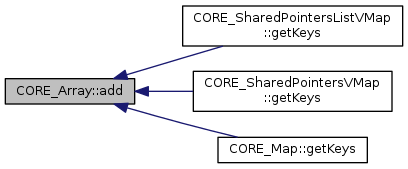
| void CORE_Array< T >::addAfterIndex | ( | const tArrayIndex & | index, |
| const T & | v | ||
| ) |
add an element after index
- Parameters
-
index must be in [0,mSize-1] v if the value inserted at index
re-allocate the array if capacity too small
References tArrayIndex.
| void CORE_Array< T >::addAfterIndices | ( | const CORE_Array< tArrayIndex > & | indices, |
| CORE_SharedPointersList< CORE_Array< T > > & | values | ||
| ) |
add alements after indices
- Parameters
-
indices array of index to add values in increasing order values at index indices[index] add the values of the array of T re-allocate the array if capacity too small
References CORE_Array< T >::get(), CORE_Array< T >::getSize(), null, tArrayIndex, tArrayIndexMax, and CORE_Integer::toString().
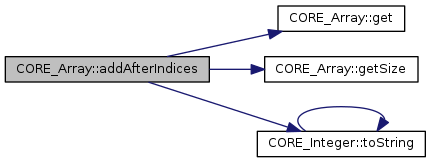
|
inline |
merge the array in this
|
inlinestaticinherited |
compare 2 primitive object
|
inlinestaticinherited |
compare 2 primitive object
|
inlinestaticinherited |
compare 2 primitive object
|
inlinestaticinherited |
compare 2 primitive object
|
inlinestaticinherited |
compare 2 primitive object
|
inlinestaticinherited |
compare 2 primitive object
|
inlinestaticinherited |
compare 2 primitive object
|
inlinestaticinherited |
compare 2 primitive object
|
inlinestaticinherited |
compare 2 primitive object
|
inlinestaticinherited |
compare 2 primitive object
|
inlinestaticinherited |
compare 2 primitive object
|
inlinestaticinherited |
compare 2 primitive object
|
inlinevirtual |
clear the array
Implements CORE_List.
Referenced by CORE_SharedPointersListVMap< Key, Value >::getKeys(), CORE_SharedPointersVMap< Key, Value >::getKeys(), CORE_Map< Key, Value >::getKeys(), and CORE_Map< Key, Value >::getValues().
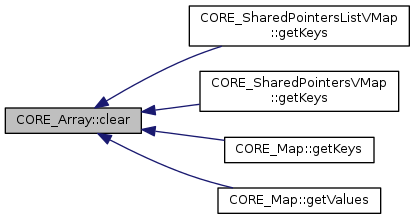
|
inlinestaticinherited |
compare 2 strings
|
inlinestaticinherited |
compare 2 ints
|
inlinestaticinherited |
compare 2 reals
| void CORE_Array< T >::contractToLastElements | ( | const tArrayIndex & | n | ) |
keep only the last n elements of the array and set its capacity also to n
References null, tArrayIndex, tArrayIndexMax, and CORE_Integer::toString().

| void CORE_Array< T >::copy | ( | const CORE_Array< T > & | src | ) |
void copy
References CORE_Array< T >::getCapacity(), CORE_Array< T >::getCapacityFactor(), CORE_Array< T >::getCompleteValues(), CORE_Array< T >::getSize(), CORE_Array< T >::getStartIndex(), and tArrayIndex.
Referenced by CORE_Array< tFlag >::copy().
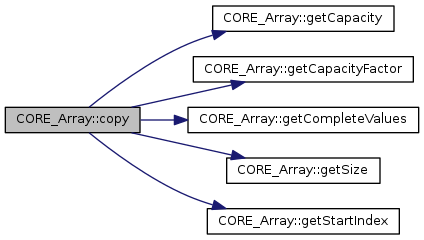

|
inline |
void copy
|
inline |
get the distance
|
inline |
return distance squared
Referenced by CORE_Array< tFlag >::distance().

|
inline |
exists
|
inline |
get the value at index i Assert in (i>-1) Assert in (i<size());
Referenced by CORE_Array< T >::addAfterIndices().

|
inline |
get the value at index i Assert in (i>-1) Assert in (i<size());
|
inline |
return the memory allocation size of the array
Referenced by CORE_Array< T >::copy().

|
inline |
get the capacity factor
Referenced by CORE_Array< T >::copy().

return the class name of the object using only the identity string
Referenced by UI_Class::createVector2D(), LAP_DoublePackedUpperMatrix::matrixProduct(), LAP_DoubleBandedUpperMatrix::matrixProduct(), LAP_DoubleFullUpperMatrix::matrixProduct(), and CORE_Object::printObjectsInMemory().
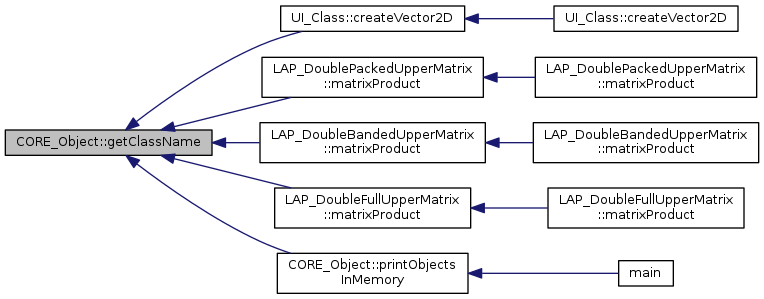
|
inherited |
return the class name of the object
- Returns
- the class name of the object
References tString.
Referenced by CORE_Object::getIdentityString().

|
inline |
get the values of the complete vector
Referenced by CORE_Array< T >::copy().

|
inline |
get the values of the complete vector
|
inlineinherited |
return the identity string of the object of the form className_at_address
- Returns
- the identity string of the object
References CORE_Object::getClassName(), CORE_Object::pointer2String(), and tString.
Referenced by UI_Class::createPrimitiveMap(), UI_Class::saveAssociation(), UI_Class::saveClass(), UI_ClassFactory::saveIntoClass(), MATH_StiefelFunction::toString(), LAP_2DView::toString(), CORE_Object::toString(), MATH_StiefelOptimizer::toString(), and MM_Class::toString().

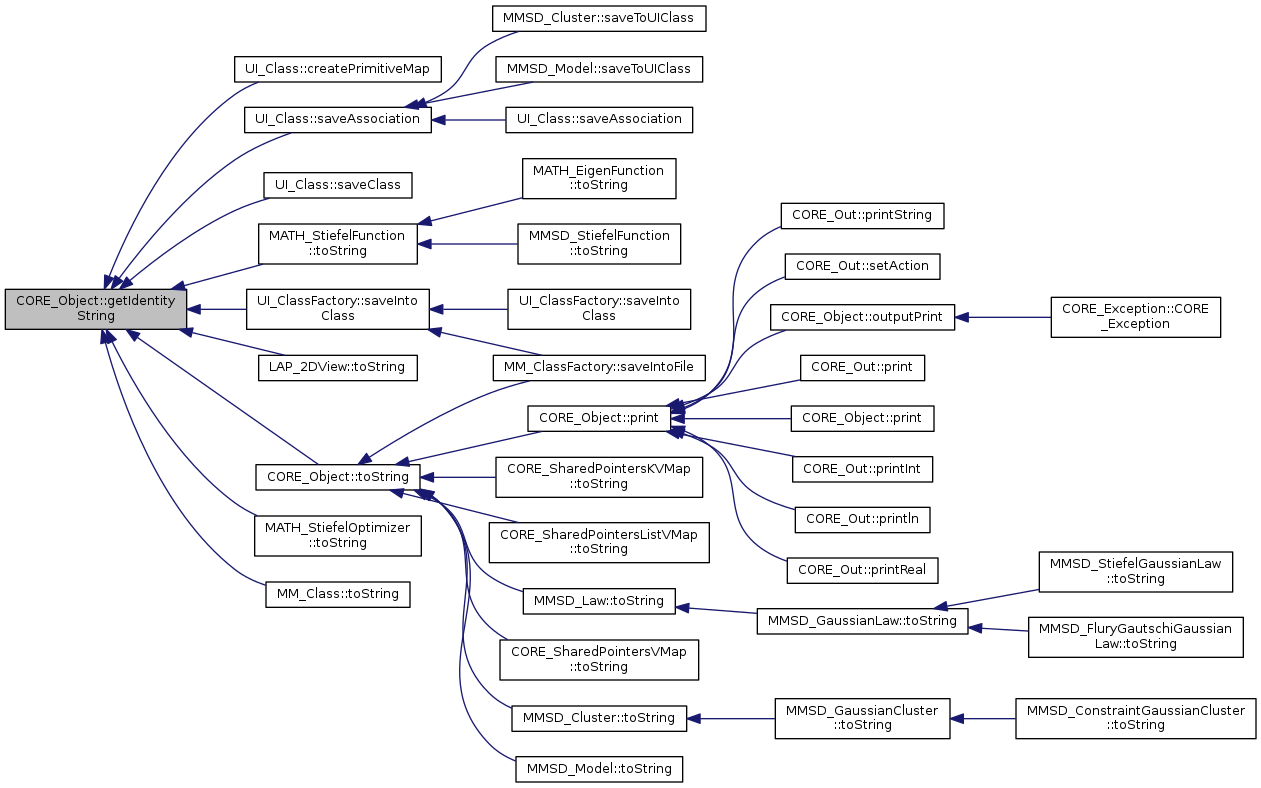
| tBoolean CORE_Array< T >::getIndex | ( | const T & | v, |
| tArrayIndex & | index | ||
| ) | const |
get the index of value return false if no value in index
References tArrayIndex.
| tBoolean CORE_Array< T >::getInfIndex | ( | const T & | v, |
| tArrayIndex & | index | ||
| ) | const |
get the inf index of value return false if no value less than v
References tArrayIndex.
|
inline |
get last element Assert in (mSize>0)
|
inlinestaticinherited |
get output
|
inlineinherited |
return the identity string of the object
- Returns
- the identity string of the object
References CORE_Object::pointer2String().

|
inline |
return the shared pointer corresponding to the class with casting
|
inlineinherited |
get the shared pointer of this class into p
Referenced by CORE_Map< Key, Value >::getSharedPointer(), CORE_Array< tFlag >::getSharedPointer(), LAP_ConstVector< lapack_real >::getSharedPointer(), STAT_Combinatorial< T >::getSharedPointer(), LAP_Vector< lapack_int >::getSharedPointer(), CORE_Vector< T >::getSharedPointer(), CORE_Matrix< T >::getSharedPointer(), and CORE_Object::printObjectsInMemory().

|
inlineinherited |
get the shared pointer of this class into p
|
inline |
return the shared pointer corresponding to the class whith casting
|
inline |
return the size of the array
Referenced by CORE_Array< T >::addAfterIndices(), CORE_Array< T >::copy(), MMSD_DataSet::getPropertyIndex(), MMSD_DataSet::getTotalPropertiesNumber(), CORE_Array< T >::merge(), STAT_Object::quantile(), UI_Class::saveField(), CORE_Array2D< T >::setRowValue(), and CORE_Array< T >::setValues().
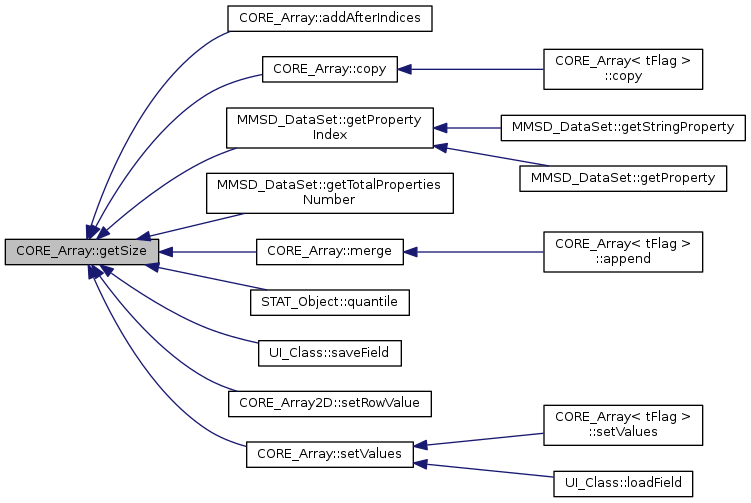
|
inline |
| tBoolean CORE_Array< T >::getSupIndex | ( | const T & | v, |
| tArrayIndex & | index | ||
| ) | const |
get the sup index of value return false if no value less than v
References tArrayIndex.
|
inlinestaticinherited |
get type name
References tString.
|
inline |
get the value at index i Assert in (i>-1) Assert in (i<size());
|
inline |
get the values of the util vector
Referenced by STAT_Object::quantile(), and UI_Class::saveField().

|
inline |
get the values of the util vector
Referenced by CORE_Array< tFlag >::getValues().

|
inline |
get the values of the util vector
|
inline |
get the values of the util vector
|
inline |
init all values to v
| tArrayIndex CORE_Array< T >::insert | ( | const tArrayIndex & | i, |
| const T & | obj | ||
| ) |
insert the object at index i re-allocate the array if capacity too small
References null, tArrayIndex, tArrayIndexMax, and CORE_Integer::toString().

|
inline |
insert the object in increasing order
- Returns
- the index of insertion re-allocate the array if capacity too small
| tArrayIndex CORE_Array< T >::insertInOrder | ( | const T & | obj, |
| const tBoolean & | evenIfEqual | ||
| ) |
insert the object in increasing order
- Returns
- the index of insertion re-allocate the array if capacity too small
References tArrayIndex.
Referenced by CORE_Array< tFlag >::insert().

|
inlinestaticinherited |
return true if the machine is a 32 bits machine
References CORE_Object::is64Architecture().

|
staticinherited |
return true if the machine is a 64 bits machine
Referenced by CORE_Object::is32Architecture().

|
inlineinherited |
return true if the object is an instance of T
References null.
| void CORE_Array< T >::merge | ( | const CORE_Array< T > & | array | ) |
merge the array in this
References CORE_Array< T >::getSize(), null, tArrayIndex, tArrayIndexMax, and CORE_Integer::toString().
Referenced by CORE_Array< tFlag >::append().


|
inlinestatic |
return a CORE_Array shared pointer
|
inlinestatic |
return a CORE_Array shared pointer
|
inline |
get the norm squared
|
inline |
|
inline |
|
inline |
|
inline |
operator *=
|
inline |
operator +=
|
inline |
operator -=
|
inline |
operator /=
|
inline |
operator =
|
inline |
get the i-th element Assert in (i>-1) Assert in (i<size());
|
inline |
get the i-th element Assert in (i>-1) Assert in (i<size());
|
staticinherited |
print on output
References null, and CORE_Object::print().
Referenced by CORE_Exception::CORE_Exception().


|
staticinherited |
return the string represantation of a pointer
References tString.
Referenced by CORE_Object::CORE_Object(), CORE_Object::getIdentityString(), CORE_Object::getPointerAddress(), and CORE_Object::~CORE_Object().
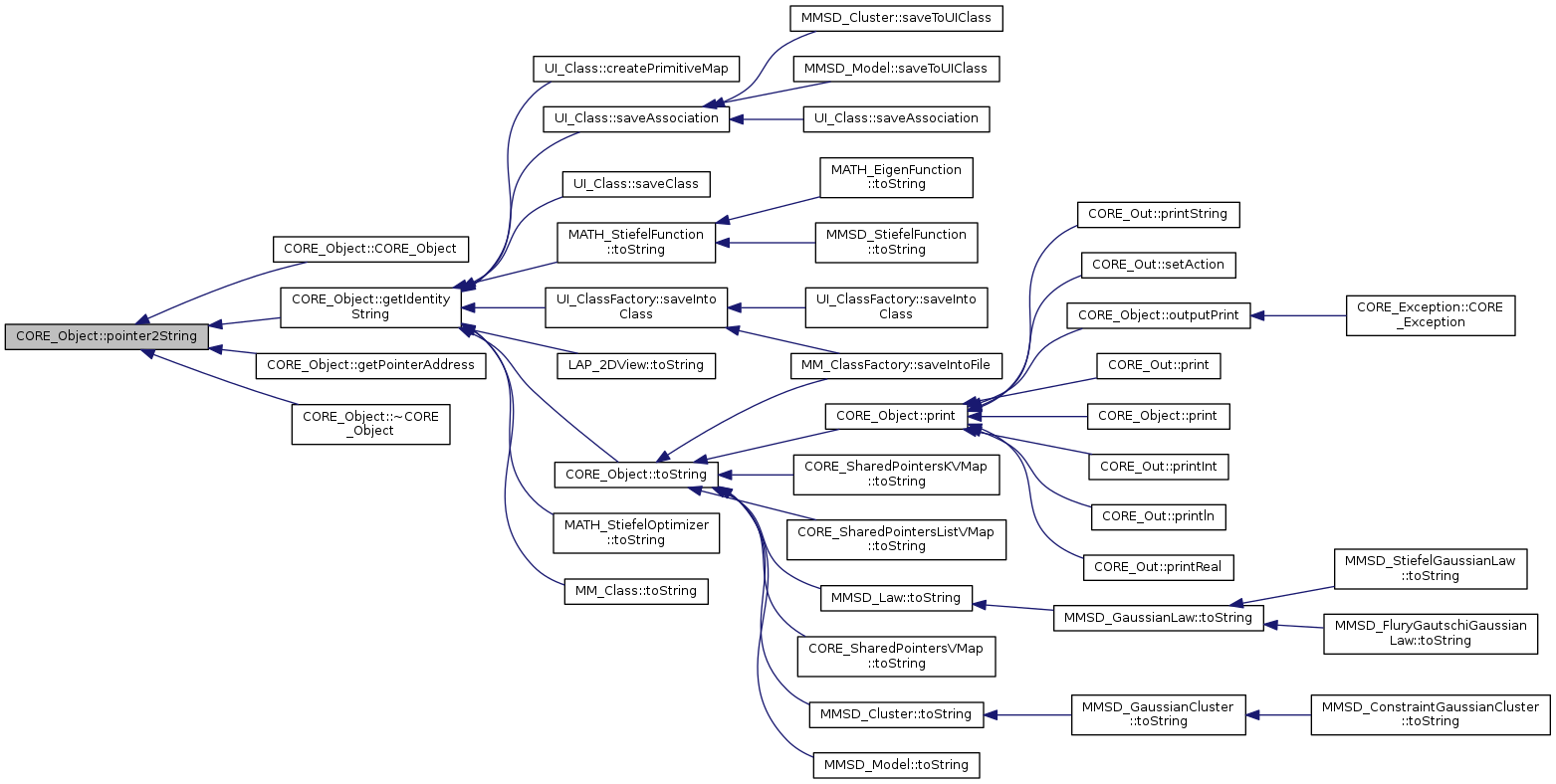
|
inlinevirtualinherited |
print the class
References CORE_Object::toString().
Referenced by CORE_Object::outputPrint(), CORE_Out::print(), CORE_Object::print(), CORE_Out::printInt(), CORE_Out::println(), CORE_Out::printReal(), CORE_Out::printString(), and CORE_Out::setAction().

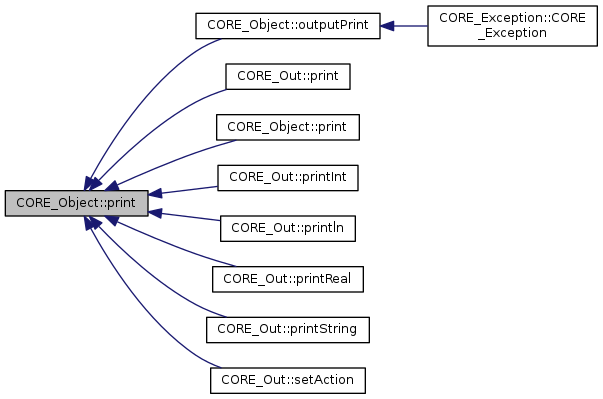
|
inlinevirtualinherited |
print the class
References CORE_Object::print(), and CORE_Object::toString().

|
virtualinherited |
print the class
Reimplemented in CORE_Out.
References null, and CORE_Object::print().

|
virtualinherited |
References null.
|
virtualinherited |
References null.
|
inlinestaticinherited |
print the class
|
staticinherited |
print object in memory
References CORE_Object::getClassName(), CORE_Object::getSharedPointer(), and CORE_Object::mIsMemoryTesting.
Referenced by main().


| tBoolean CORE_Array< T >::remove | ( | const T & | obj | ) |
remove the object
- Returns
- true if the objet exists,
- false otherwise.
References tArrayIndex, and tBoolean.
|
inline |
remove the last element
| tBoolean CORE_Array< T >::removeAtIndex | ( | const tArrayIndex & | i | ) |
brief remove the object at index i
- Returns
- true if the objet exists,
- false otherwise.
References tArrayIndex.
Referenced by CORE_Array< tFlag >::remove().

| void CORE_Array< T >::resize | ( | ) |
resize the array to the util size
- the start index attribute is set to 0
References null, tArrayIndex, tArrayIndexMax, and CORE_Integer::toString().

| void CORE_Array< T >::resize | ( | const tArrayIndex & | n | ) |
resize the array to n
References null, tArrayIndex, tArrayIndexMax, and CORE_Integer::toString().

| void CORE_Array< T >::reverse | ( | ) |
reverse the vector
References tArrayIndex.
|
static |
search the value in values array ordered in order
Referenced by CORE_Array< tFlag >::search().

|
inline |
search the value in values vector ordered in order
|
inline |
set the object at the index i
Referenced by CORE_Map< Key, Value >::getValues(), and CORE_Array< tFlag >::setValue().

| void CORE_Array< T >::setCapacity | ( | const tArrayIndex & | c | ) |
set the capacity of the vector
References null, tArrayIndex, tArrayIndexMax, and CORE_Integer::toString().

|
inline |
set the capacity factor
|
inlinestaticinherited |
set output
| void CORE_Array< T >::setSize | ( | const tArrayIndex & | n | ) |
set the size of the array
References tArrayIndex.
Referenced by CORE_Array< tFlag >::clear(), STAT_DiracDistribution::computeSample(), STAT_BernoulliDistribution::computeSample(), STAT_PoissonDistribution::computeSample(), STAT_InverseNormalDistribution::computeSample(), STAT_BinomialDistribution::computeSample(), STAT_ExponentialDistribution::computeSample(), STAT_GeometricDistribution::computeSample(), STAT_NormalDistribution::computeSample(), STAT_GammaDistribution::computeSample(), STAT_UniformDistribution::computeSample(), CORE_Map< Key, Value >::getValues(), MMSD_DataSet::setProperties(), and CORE_Array< tFlag >::setValues().
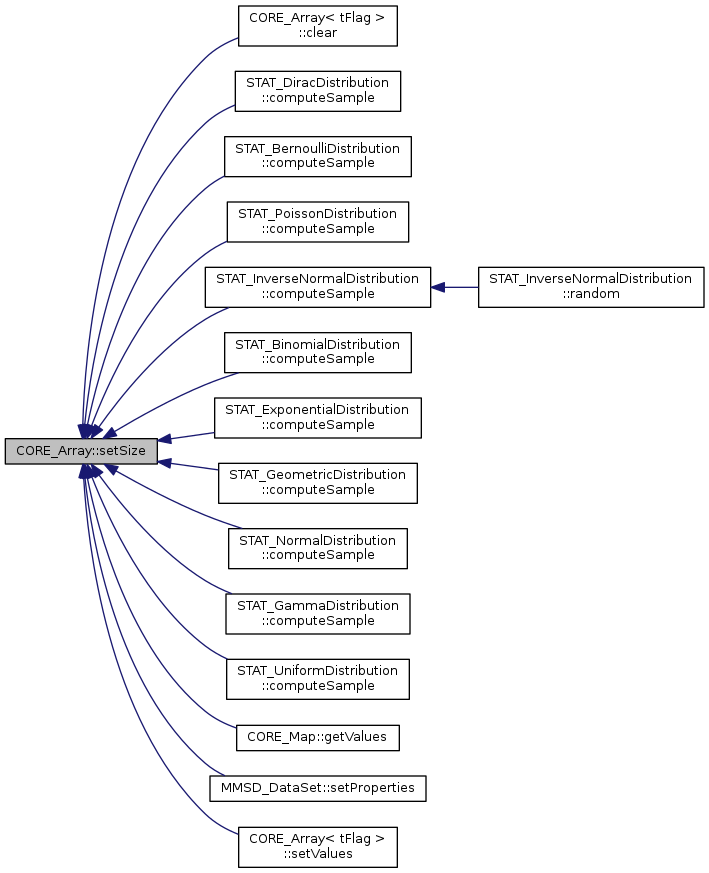
|
inline |
set the start index of the array adjust the size of the array such that the last element of the array is always the last element i.e: suppose size is 5 setStartIndex(2);-> size=3 setStartIndex(1);->size=4 setStartIndex(0);->size=5
|
inlineprotectedinherited |
set this weak shared pointer called toDoAfterThis setting method
References CORE_Object::toDoAfterThisSetting().

|
inlineprotectedvirtualinherited |
set the type of the object
Referenced by LAP_IntegerVector::LAP_IntegerVector(), MATH_BetaFunction::MATH_BetaFunction(), MATH_C1Function::MATH_C1Function(), MATH_DigammaFunction::MATH_DigammaFunction(), MATH_EigenFunction::MATH_EigenFunction(), MATH_Equation::MATH_Equation(), MATH_Function::MATH_Function(), MATH_GammaFunction::MATH_GammaFunction(), MATH_KeplerFunction::MATH_KeplerFunction(), MATH_LogGammaFunction::MATH_LogGammaFunction(), MATH_NewtonEquation::MATH_NewtonEquation(), MATH_StiefelFunction::MATH_StiefelFunction(), MATH_StiefelOptimizer::MATH_StiefelOptimizer(), MATH_TranscendentEquation::MATH_TranscendentEquation(), MATH_TrigammaFunction::MATH_TrigammaFunction(), MATH_ZeroEquation::MATH_ZeroEquation(), MATH_ZKeplerFunction::MATH_ZKeplerFunction(), MM_Attribute::MM_Attribute(), MM_Class::MM_Class(), MM_ClassFactory::MM_ClassFactory(), MM_Data::MM_Data(), MM_Structure::MM_Structure(), MMSD_ClassFactory::MMSD_ClassFactory(), MMSD_Cluster::MMSD_Cluster(), MMSD_ConstDoubleVector::MMSD_ConstDoubleVector(), MMSD_ConstraintGaussianCluster::MMSD_ConstraintGaussianCluster(), MMSD_ConstraintGaussianModel::MMSD_ConstraintGaussianModel(), MMSD_DataSet::MMSD_DataSet(), MMSD_DataSetClassFactory::MMSD_DataSetClassFactory(), MMSD_DoubleFullMatrix::MMSD_DoubleFullMatrix(), MMSD_DoubleSymmetricMatrix::MMSD_DoubleSymmetricMatrix(), MMSD_DoubleVector::MMSD_DoubleVector(), MMSD_FluryGautschiGaussianLaw::MMSD_FluryGautschiGaussianLaw(), MMSD_GaussianCluster::MMSD_GaussianCluster(), MMSD_GaussianFDFunction::MMSD_GaussianFDFunction(), MMSD_GaussianLaw::MMSD_GaussianLaw(), MMSD_GaussianModel::MMSD_GaussianModel(), MMSD_Law::MMSD_Law(), MMSD_Model::MMSD_Model(), MMSD_ModelClassFactory::MMSD_ModelClassFactory(), MMSD_Object::MMSD_Object(), MMSD_StiefelFunction::MMSD_StiefelFunction(), MMSD_StiefelGaussianLaw::MMSD_StiefelGaussianLaw(), STAT_BernoulliDistribution::STAT_BernoulliDistribution(), STAT_BinomialDistribution::STAT_BinomialDistribution(), STAT_Combinatorial< T >::STAT_Combinatorial(), STAT_DiracDistribution::STAT_DiracDistribution(), STAT_Distribution::STAT_Distribution(), STAT_ExponentialDistribution::STAT_ExponentialDistribution(), STAT_GammaDistribution::STAT_GammaDistribution(), STAT_GeometricDistribution::STAT_GeometricDistribution(), STAT_InverseNormalDistribution::STAT_InverseNormalDistribution(), STAT_NormalDistribution::STAT_NormalDistribution(), STAT_Object::STAT_Object(), STAT_PoissonDistribution::STAT_PoissonDistribution(), STAT_UniformDistribution::STAT_UniformDistribution(), and STAT_UniformLaplaceTransform::STAT_UniformLaplaceTransform().
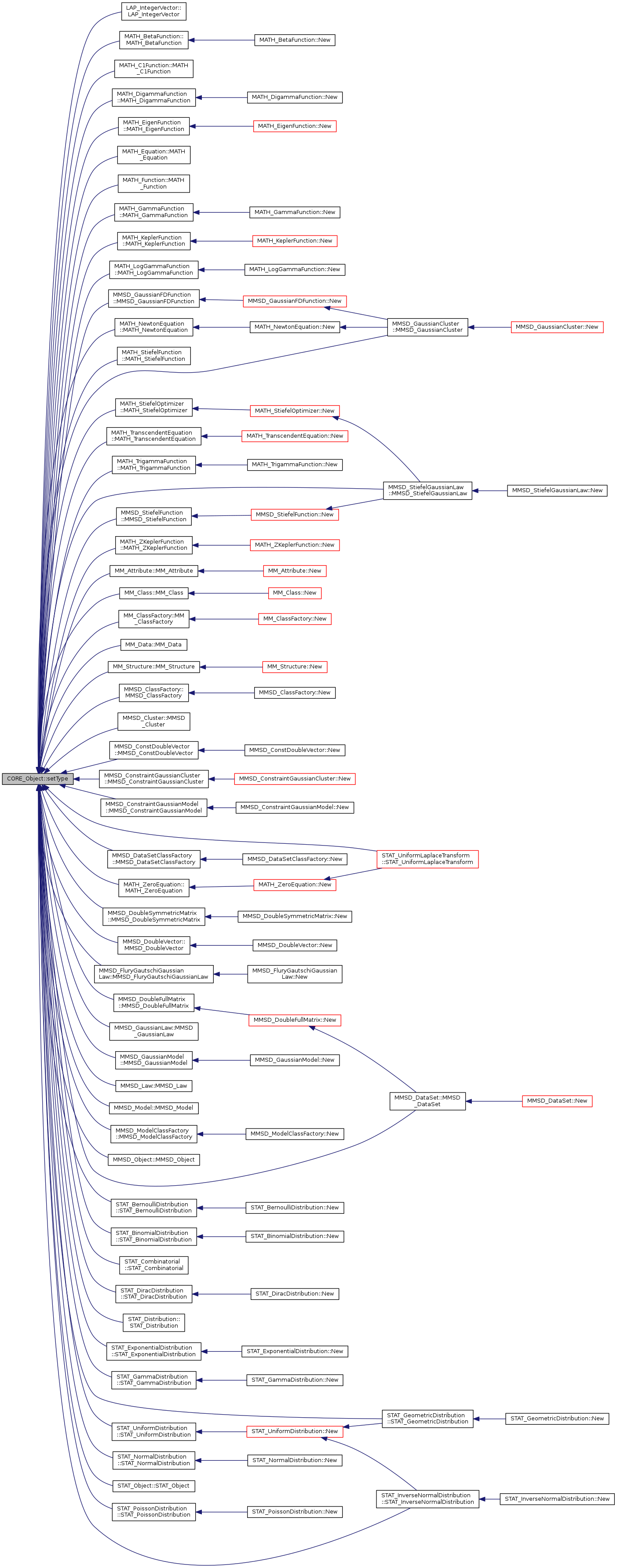
|
inline |
set the object at the index i
| void CORE_Array< T >::setValues | ( | const CORE_Array< T > & | array, |
| const tArrayIndex & | fromIndex | ||
| ) |
copy a CORE_Array from fromIndex index and set the start index to fromIndex.
References CORE_Array< T >::getSize(), and tArrayIndex.
Referenced by UI_Class::loadField(), and CORE_Array< tFlag >::setValues().


|
inline |
copy a CORE_Array and convert it
|
inline |
copy a CORE_Array and convert it
| void CORE_Array< T >::setValues | ( | const tArrayIndex & | n, |
| const T * | array, | ||
| const tArrayIndex & | fromIndex | ||
| ) |
copy an array of T on size n to the This value from fromIndex and set the start index to fromIndex.
References tArrayIndex.
|
inline |
copy an array of T
| void CORE_Array< T >::setValues | ( | const vector< T > & | array, |
| const tArrayIndex & | fromIndex | ||
| ) |
copy an array of T from fromIndex index and set the start index to fromIndex.
References tArrayIndex.
|
inline |
copy an array of T
| void CORE_Array< T >::setValues | ( | const tString & | str, |
| const tArrayIndex & | fromIndex | ||
| ) |
set the values of the array thanks to the string representation of the dorm [x0,x1,x2,...x_n] and set the start index to fromIndex.
References CORE_String::New(), and CORE_String::parse().

|
inline |
set the values of the array thanks to the string representation of the dorm [x0,x1,x2,...x_n]
|
inline |
set the the values by reference the values is destroyed at the end if hasToBeDeleted is true
Referenced by UI_Class::loadField().

|
inline |
return the size of the array
Referenced by CORE_Array< tFlag >::remove().

|
inline |
sort the array in an increasing order
Referenced by CORE_Array< tFlag >::sort().

|
inline |
sort the array
|
static |
|
inlineprotectedvirtualinherited |
method called after setThis() method this method can oly be called once.
Reimplemented in STAT_UniformLaplaceTransform.
Referenced by CORE_Object::setThis(), and STAT_UniformLaplaceTransform::toDoAfterThisSetting().

|
virtual |
turn the array into string
Reimplemented from CORE_Object.
References tArrayIndex, CORE_Integer::toString(), CORE_String::toString(), and tString.
Referenced by testBinomialDistribution(), testGeometricDistribution(), and testPoissonDistribution().


Member Data Documentation
|
staticinherited |
indicator to store all classes created and deleted only for debuging version
Referenced by CORE_Object::CORE_Object(), main(), CORE_Object::printObjectsInMemory(), and CORE_Object::~CORE_Object().
The documentation for this class was generated from the following files:


 1.8.8
1.8.8